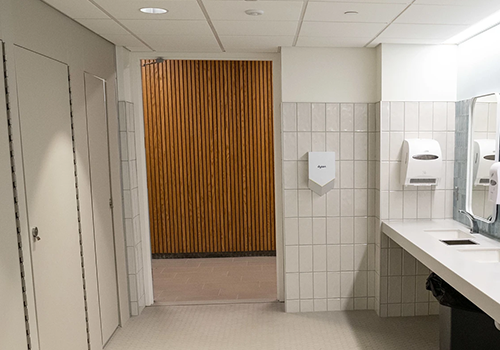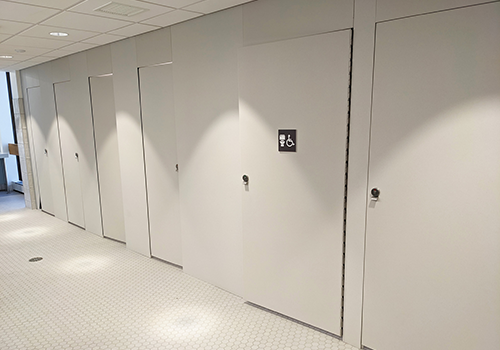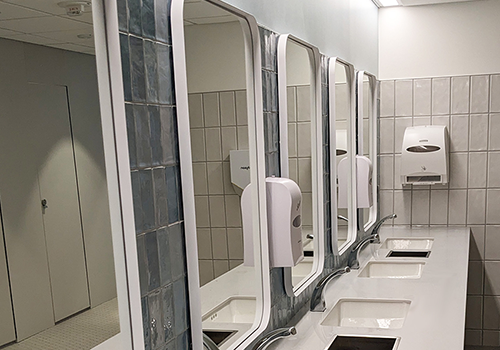Restroom Design at Carnegie Mellon
CMU is building restrooms designed with everyone in mind, including caregivers and children, people with limited mobility, and transgender, intersex, nonbinary and gender-expansive individuals. As we create new campus spaces and renovate old ones, we are adding more single-user restrooms and making our multi-user facilities more accessible with features such as:



We recognize the essential role that universally accessible, convenient and safe restrooms play in affirming a sense of belonging for all in our living and learning community. Carnegie Mellon is committed to creating and maintaining spaces that both respond to and anticipate the varied needs of our community.
View an interactive campus map showing restroom facility locations or see the list of single-user restrooms below. Click on the building name to view that building's floor plans (Andrew ID required). If you are aware of a restroom that is not listed, or you have other restroom questions or suggestions, please email restroomaccess@andrew.cmu.edu.
List of single-user restrooms on campus
Academic/Administrative Buildings
| Building | Floor | Floor Plan Room # | Notes |
| Alumni House | Floor 1 | 124 | |
| Floor 1 | 125 | ||
| Floor 2 | 224 | ||
| Floor 3 | 324 | ||
| Ansys Hall | Floor B | B04 | |
| Baker-Porter Hall | Floor A | A27N* |
*Non-accessible **Inside an office suite that is locked after hours |
| Floor A | A65 | ||
| Floor 3 | 377** | ||
| Floor 3 | 378** | ||
| Floor 3 | 389B | ||
| Floor 4 | 436L | ||
| Bakery Square | Floor 4 | (no assigned number) | Adjacent to main elevator lobby |
| Bramer House | Floor 1 | 100B | Non-accessible |
| Floor 2 | 202A | ||
| Floor 2 | 203A | ||
| College of Fine Arts (CFA) | Floor A | A62 | |
| Floor 1 | 106B | ||
|
Floor 1 |
196B |
|
|
| Floor 1 |
196C |
||
| Doherty Hall | Floor 1 | 1252 | *Non-accessible |
| Floor 1 | 1253 | ||
| Floor 4 | 4211* | ||
| Floor 4 | 4214* | ||
| Facilities Management Services Building (FMSB) | Floor 1 | 117 | *Non-accessible |
| Floor 3 | 355* | ||
| Fifth Ave. 4721 | Floor A | A010 | |
| Floor 1 | 110 | ||
| Floor 1 | 111 | ||
| Floor 2 | 211 | ||
| Floor 3 | 311 | ||
| Fifth Ave. 4802 (WQED) | Floor 1 | 1003 | |
| Floor 1 | 1004 | ||
| Floor 2 | 2003 | ||
| Floor 2 | 2004 | ||
| Forbes Ave. 4615 (GATF) | Floor 3 | 300A | *Non-accessible |
| Floor 3 | 300C | ||
| Floor 3 | 335 | ||
| Floor 3 | 347 | ||
| Floor 4 | 418 | ||
| Floor 4 | 418A | ||
| Gates & Hillman Centers | Floor 4 | 4831 | |
| Floor 5 | 5116 | Inside an office suite | |
| Hall of the Arts (HOA) | Floor A | A50A | *Non-accessible |
| Floor 1 | 104A* | ||
| Floor 1 | 192 | ||
| Hamburg Hall | Floor A | A412 | Non-accessible |
| Hamerschlag Hall | Floor B | B154 | |
| Floor C | C167 | ||
| Floor 1 | 1117 | ||
| Henry Stret 4616 (INI) | Floor 1 | 114 | |
| Henry Street 4618 | Floor 1 | 103 | |
| Floor 2 | 204 | ||
| Henry Street 4620 | Floor 1 | 103 | Non-accessible |
| Highmark Center for Health, Wellness and Athletics | Floor 1 | 117 | For wellness suite - not publicly accessible |
| Floor 1 | 126 | Inside multi-user restroom | |
| Floor 1 | 128 | Inside multi-user restroom | |
| Floor 1 | 129 | ||
| Floor 1 | 131A | ||
| Floor 1 | 132 | Single-user locker room, with shower - not publicly accessible | |
| Floor 1 | 133A | Inside men's coaches/officials locker room, with shower - not publicly accessible | |
| Floor 1 | 142H | Inside athletics rehab area - not publicly accessible | |
| Floor 1 | 143A | Inside visiting locker room - not publicly accessible | |
| Floor 1 | 145A | Inside visiting locker room - not publicly accessible | |
| Floor 2 | 206 | Inside multi-user restroom | |
| Floor 2 | 207 | Inside multi-user restroom | |
| Floor 2 | 238 | For athletics suite - not publicly accessible | |
| Floor 2 | 260 | Single-user locker room, with shower - not publicly accessible | |
| Floor 2 | 262A | ||
| Floor 2 | 262B | ||
| Floor 3 | 306 | ||
| Floor 3 | 307 | ||
| Floor 3 | 310A | For UHS suite, inside sick waiting room - not publicly accessible | |
| Floor 3 | 327 | For UHS suite - not publicly accessible | |
| Floor 3 | 329 | For UHS suite - not publicly accessible | |
| Floor 3 | 331 | For UHS suite - not publicly accessible | |
| Floor 3 | 353 | For UHS suite - not publicly accessible | |
| Floor 3 | 369 | For UHS suite - not publicly accessible | |
| Floor 4 | 406 | Inside multi-user restroom | |
| Floor 4 | 407 | Inside multi-user restroom | |
| Floor 4 | 409 | For HP suite - not publicly accessible | |
| Floor 4 | 419 | For CAPS suite - not publicly accessible | |
| Floor 4 | 442 | For CAPS suite - not publicly accessible | |
| Floor 4 | 443 | For CAPS suite - not publicly accessible | |
| Floor 4 | 445 | For CAPS suite - not publicly accessible | |
| Hunt Library | Floor 1 | No room number | *Non-accessible |
| Floor 1 | 122a | ||
| Floor 1 | 122b | ||
| Floor 2 | 208* | ||
| Jared L. Cohon University Center | Lower Level | LL84A | *Located inside gym area - must have a CMU ID for entrance |
| Lower Level | LL84B | ||
| Floor 1 | 145 | ||
| Floor 1 | 146E | ||
| Floor 1 | 147 | ||
| Floor 1 | 154A* | ||
| Floor 1 | 154B* | ||
| Floor 1 | 179 | ||
| Landscape Support Facility | Floor 1 | 103 | |
| Floor 2 | 201 | ||
| Margaret Morrison Carnegie Hall | Floor A | A24* | *Non-accessible |
| Floor 1 | 125* | ||
| Floor 2 | 216F | ||
| Floor 3 | 323 | ||
| Floor 4 | 425A | ||
| Mellon Institute | Floor 1 | 117A | *Non-accessible |
| Floor 1 | 117B | ||
| Floor 3 | 316E* | ||
| Floor 3 | 318A* | ||
| Floor 3 | 340C* | ||
| Floor 6 | 620 | ||
| Floor 7 | 720 | ||
| National Robotics Engineering Center (NREC) | Floor 2 | R23 | |
| Floor 2 | R24 | ||
| Floor 2 | R25 | ||
| Floor 2 | R26 | ||
| Newell-Simon Hall | Floor B | B522* | *Next to stairwell |
| Floor 1 | R1100 | ||
| Floor 1 | R1101 | ||
| Floor 1 | R1102 | ||
| Floor 1 | R1103 | ||
| Purnell Center for the Arts | Floor A | A20* |
*Attached to theater dressing rooms, and not available during productions **Marked for faculty, but available for staff and student use |
| Floor A | A23* | ||
| Floor A | A37* | ||
| Floor A | A40* | ||
| Floor 1 | 101A | ||
| Floor 1 | 103A | ||
| Floor 1 | 105 | ||
| Floor 1 | 107C | ||
| Floor 1 | 113A | ||
| Floor 2 | 202 | ||
| Floor 2 | 228 | ||
| Floor 3 | 311** | ||
| Floor 3 | 352** | ||
| Robotics Innovation Center | Floor 1 | R100 | * Inside lactation room - not publicly accessible **Also has a shower |
| Floor 1 | R103* | ||
| Floor 1 | R105** | ||
| Floor 2 | R200 | ||
| Floor 2 | R204** | ||
| Scaife Hall | Floor B | B07* | *Also has a shower |
| Floor 2 | 205 | ||
| Floor 4 | 425 | ||
| Floor 4 | 427 | ||
| Floor 4 | 429* | ||
| South Craig 205 | Floor 1 | 106 | *Non-accessible |
| Floor 2 | 207* | ||
| South Craig 300 | Floor 1 | 101A | |
| South Craig 311 (III) | Floor 1 | 109 | |
| South Craig 417 | Floor 2 | 200A* | *Non-accessible |
| Floor 2 | 200B* | ||
| Floor 2 | 210* | ||
| Floor 3 | 300B | ||
| Floor 3 | 300C | ||
| TCS Hall | Floor A | A104 | Shower in room |
| Floor 1 | 104 | ||
| Floor 3 | 304 | ||
| Tepper Quad | Floor 1 | 1105 | *In student lounge |
| Floor 1 | 1122 | ||
| Floor 1 | 1924 | ||
| Floor 2 | 2203 | ||
| Floor 2 | 2204 | ||
| Floor 2 | 2408 | ||
| Floor 2 | 2924 | ||
| Floor 3 | 3806* | ||
| Floor 4 | 4505 | ||
| Floor 4 | 4924 | ||
| Floor 5 | 5608 | ||
| Warner Hall | Floor A | A35* |
*Non-accessible **Not publicly accessible facilities |
| Floor A | A36* | ||
| Floor 2 | 207 | ||
| Floor 3 | 320 | ||
| Floor 4 | 407** | ||
| Floor 5 | 507** | ||
| Floor 6 | 607** |
University Housing
The facilities in the residential buildings below are limited to student access only.
| Building | Floor |
Floor Plan Room # |
Notes |
| Boss House | Floor A | B12 | |
| Clyde House | Floor 1 | 109 | |
| Donner House | Floor 1 | 122 | |
| Henderson House | Floor A | A04 | Next to communal lounge space |
| Margaret Morrison Plaza | Floor A | A21 | Intersection Lounge |
| McGill House | Floor A | B12 | |
| Morewood Gardens | Basement | Floor B | Outside D-Tower laundry room |
| Floor 1 | 115A | Near the kitchen | |
| Morewood E-Tower | Floor 1 | 133 | |
| Mudge House | Floor 1 | Floor 1 | 1st Floor of A-Tower |
| Resnik House | Floor 1 | Floor 1 | Near Cruciform Room |
| Scobell House | Floor 1 | Floor 1 | Next to laundry room |
| Shirley Apartments | Floor A | Floor A | |
| Stever House | Floor 1 | Floor 1 | Two facilities, across from Quiet Study |
| The Residence on 5th | Floor 1 | Floor 1 | Two facilities |
| Welch House | Floor 1 | Floor 1 | Next to communal lounge space |
| West Wing | Floor 2 |
204 |
Public access restrooms located in the lobby and main hallway. Remaining facilities are designated for staff in Career & Professional Development Center; operating hours may affect access to all facilities.
|
| Floor 2 | 214 | ||
| Floor 2 |
226 |
||
| Floor 2 |
236 |
||
| Floor 2 | 242 | ||
| Floor 2 | 256 | ||
| Floor 2 | 266 | ||
| Floor 2 | 278 | ||
| Floor 2 | 286 |